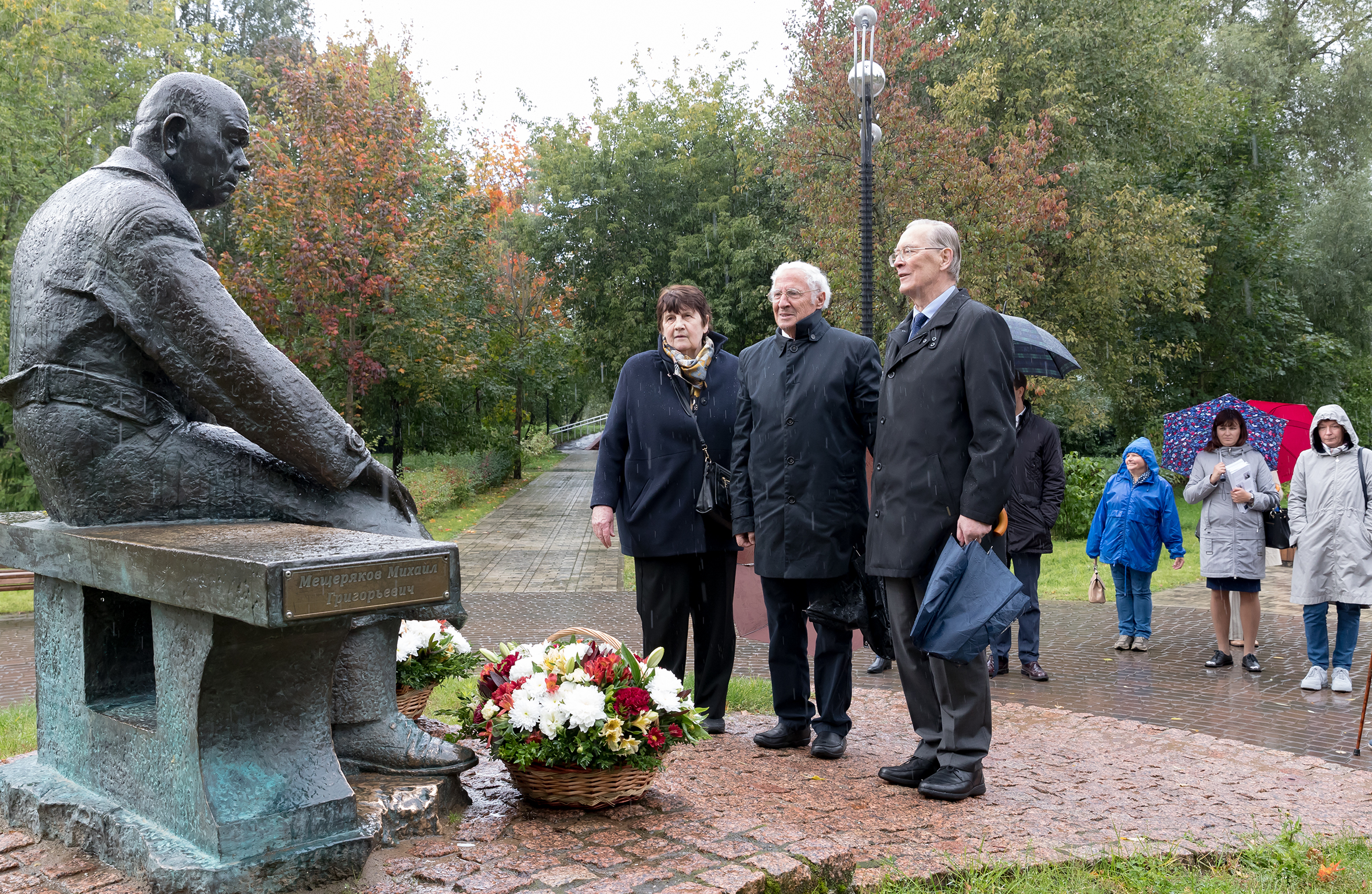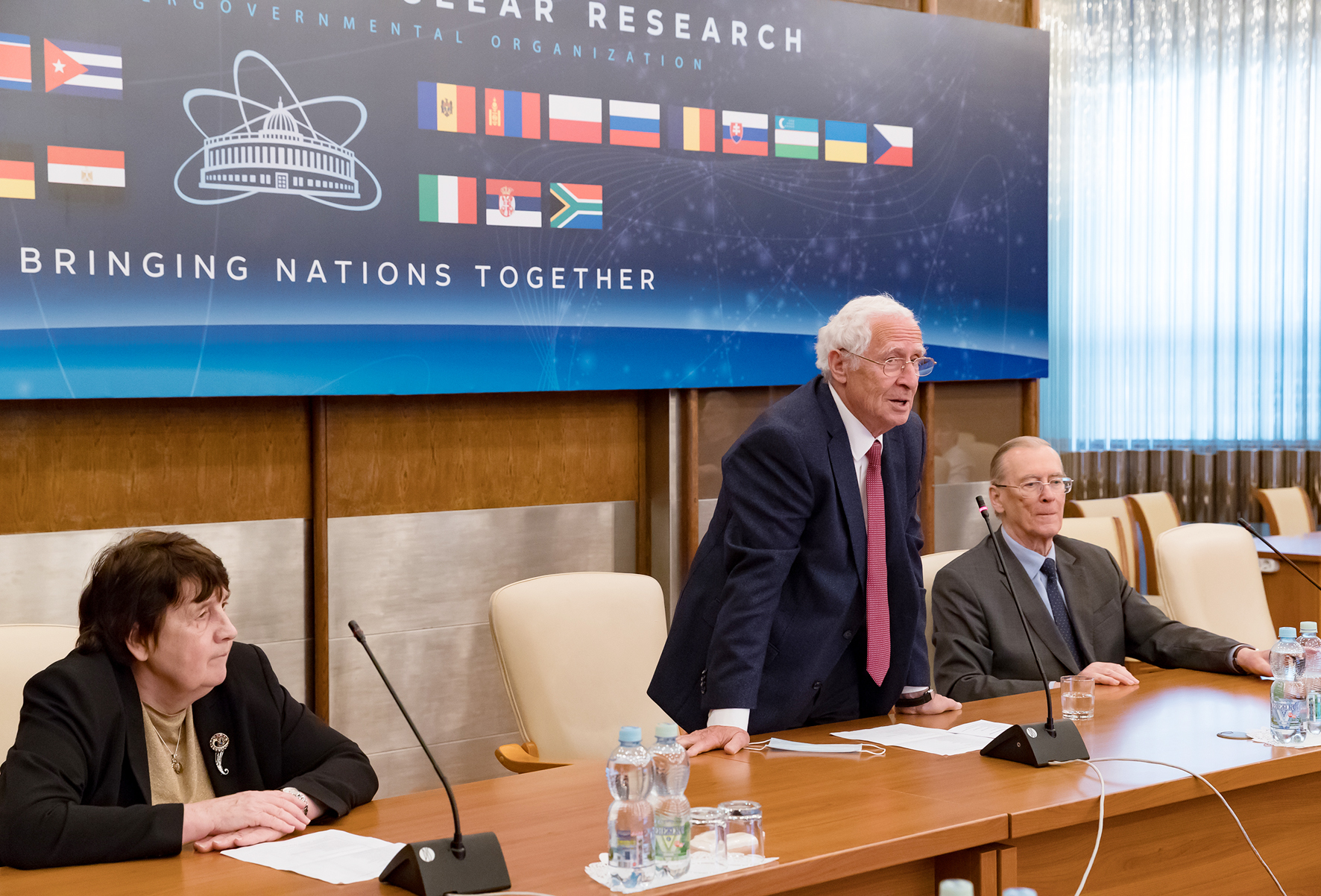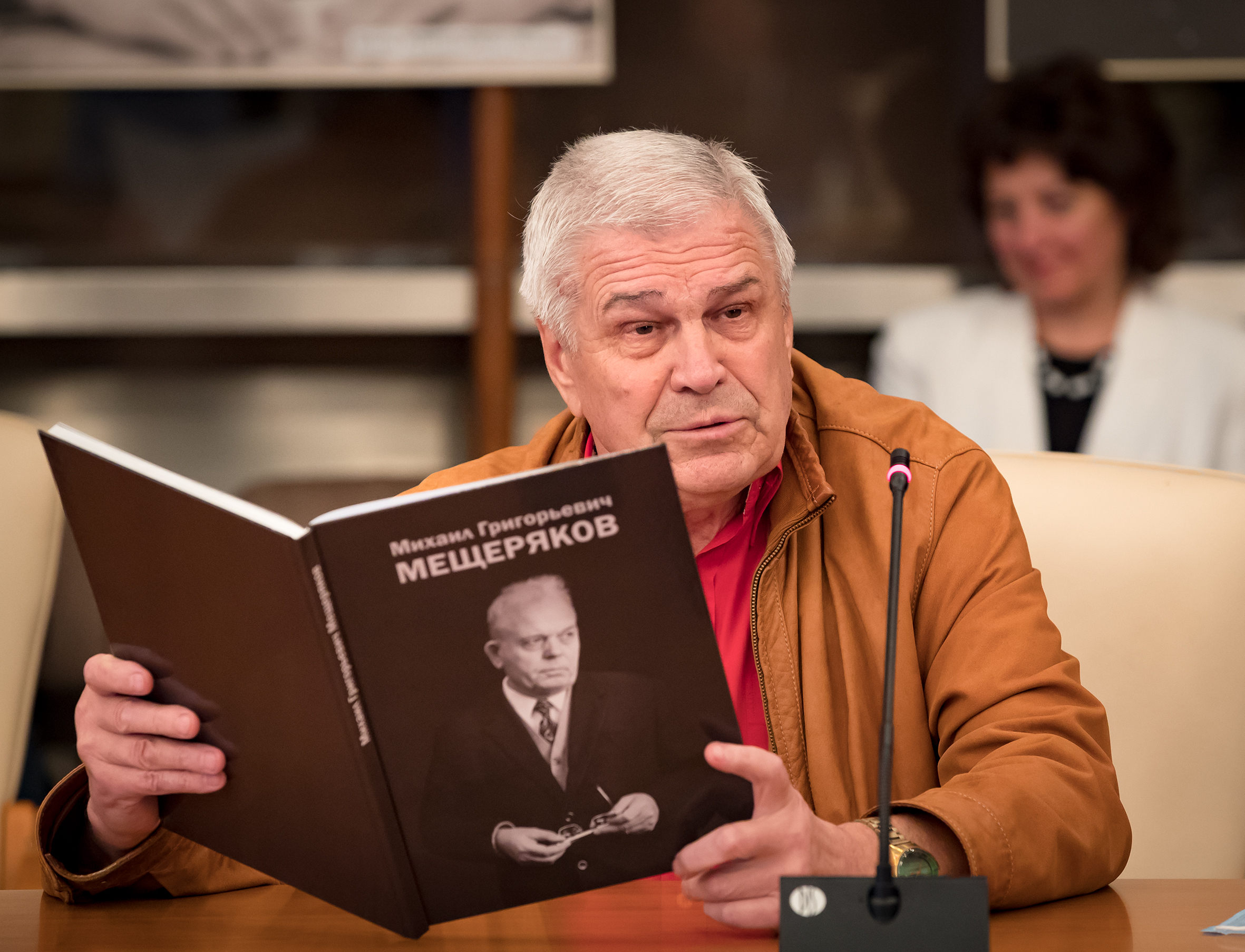When tasks were formidable and risks costed lives
News, 16 October 2020
On 18 September, JINR solemnly celebrated the 110th anniversary of the birth of M. G. Meshcheryakov, one of the Dubna and the Joint Institute founders. Heads of the Institute and the city, JINR staff members and citizens of Dubna gathered to lay flowers to his monument.
The memorial seminar in the International Conference Hall was opened by FLNR Deputy Scientific Leader M. G. Itkis, “Unfortunately, the pandemic interfered with our plans to hold a large-scale conference dedicated to this jubilee, but we did not cancel the event, and today, everyone who knew Mikhail Grigorievich, an outstanding man, scientist and organizer, have come here.”
Photos and record of memorial seminar dedicated to 110th anniversary of birth of M. G. Meshcheryakov
“110 years ago, a man was born whose name is inextricably linked with the foundation of the Joint Institute, LIT, the city,” JINR Director V. A. Matveev said. “A man of a national scale, he was engaged in the problem of nuclear safety of the country, the creation of the largest synchrocyclotron of that time. We know how difficult it is to create and launch such an accelerator just in over two years. It was a heroic epoch when people did not separate their lives from the country’s fate, and Mikhail Grigorievich fully belonged to that era. M. G. Meshcheryakov and N. N. Govorun established the unique Laboratory of Computing Techniques and Automation where the solution for automation of physical processes was found and laid the foundations of our current science.”
“I have been working at LCTA since the very beginning,” A. A. Karlov (LIT) joined the event online. “And I first met Mikhail Grigorievich when I wanted to interview him for a wall newspaper about his participation in the US atomic bomb tests. ‘You know, young man, it is too early to discuss such things, come back in ten years!’ Later on, we met a lot, he told me various stories about his life experience, including this trip to Bikini Atoll. Before the trip, an old woman who knew pre-revolutionary etiquette was attached to him, and she taught him what and when cutlery to use and how to eat lobster.
He had a broad way of thinking, he understood that computer technology should cover all the research fields of the Institute. I always recall Mikhail Grigorievich very warmly, he gave me a lot. The bright memory of him will always remain in my heart.”
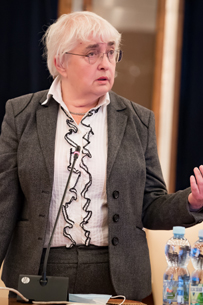 “I would like to thank everyone for the preserved memory of Mikhail Grigorievich,” the niece of M. G. Meshcheryakov G. P. Meshcheryakova started her speech. “His life and lives of all the physicists whose portraits are exposed here can be described by the old Latin proverb ‘Through the thorns to the stars’. Aging, one gets to understand that thorns are the necessary prerequisite to achieve the stars or at least to see them. They make us stay strong, they forge our willpower. The generation of Mikhail Grigorievich had so many thorns: the civil war, the war with the White movement, the Finnish war. He was one of those soldiers who took part in the frontal attack on the Mannerheim Line, and, interestingly, the fortifications were three-floor high above the earth and seven-floor deep under the ground. He was in a hospital in the besieged Leningrad after being shell-shocked. By the time they were removed in the spring, there were only two alive patients left.
“I would like to thank everyone for the preserved memory of Mikhail Grigorievich,” the niece of M. G. Meshcheryakov G. P. Meshcheryakova started her speech. “His life and lives of all the physicists whose portraits are exposed here can be described by the old Latin proverb ‘Through the thorns to the stars’. Aging, one gets to understand that thorns are the necessary prerequisite to achieve the stars or at least to see them. They make us stay strong, they forge our willpower. The generation of Mikhail Grigorievich had so many thorns: the civil war, the war with the White movement, the Finnish war. He was one of those soldiers who took part in the frontal attack on the Mannerheim Line, and, interestingly, the fortifications were three-floor high above the earth and seven-floor deep under the ground. He was in a hospital in the besieged Leningrad after being shell-shocked. By the time they were removed in the spring, there were only two alive patients left.
In his memoirs, there is a description of how V. G. Khlopin was dying. Not knowing about the danger of radiation, the scientist ran across corridors of the Radium Institute with a source in his pocket and conducted research. And then he only noted: I have problems with blood. What was so special about them? He never complained about life, he did not whine in his letters. Mikhail Grigorievich was passionate about science, it was his only passion in life. It led him, an illiterate boy (only 4 grades at school and rabfak), to Leningrad University, and he graduated with brilliant results. He became an erudite person, he knew languages, history, philosophy, he was an outstanding storyteller, students remembered his lectures. He returned from the USA although he would have built a brilliant career there and he would have become only a high-rank official. And science waited for him here. And he returned to post-siege Leningrad from comforts of America.
I tried to compare what was then and what is now: these are incommensurable things. Gone is the spirit, the spirit of a man who knew how to lead. They were called science generals. They could foresee things, they achieved goals at a very high price sometimes. Judge them or not? We cannot evaluate those risks they were exposed to. They sacrificed everything – family, children – they had only work in minds. What is left? Scientific achievements? No. They become classics of science. Scientific schools live longer but as luck would have it. Decent students are necessary to continue this work. A general may lose the battle but win the campaign, and everyone will remember the won campaign. Mikhail Grigorievich won his campaign. Dubna lives and develops, although I feel sorry for the old Dubna, it was warm and lively. It is a miracle that the Institute survived somehow, there was something that did not allow it to break down in difficult times. LCTA is the Swan song of Mikhail Grigorievich. When I was a little girl, I once went with him and N. N. Govorun from Moscow to Dubna, and they were talking about the necessity to purchase IBM machines all the way long. Nothing else interested them, they created a marvellous computing centre. They argued with each other, fought, but they won their campaigns. One very smart man once told me that if the Soviet Union had not made an atomic bomb, then in the 1990s, the country might have disappeared. Eternal memory to them for sacrificing their lives for the sake of science! Thank you all!”
“So much has been written about Mikhail Grigorievich that it is difficult to add anything,” R. Pose (LIT) said online. “I would like to recall one episode from the Institute’s life. When electronic computing machines took a prominent place in particle physics in the late 1960s, problems also became obvious. It became clear that the development pace of computing hardware and software did not correspond to the development pace of science. Institute in Western and socialist countries began to speak different computer languages, which hindered cooperation. So, scientists came up with the idea to purchase computing equipment in the United States, and this required a large amount of money in foreign currency. There were also opponents of this decision. It was decided to hold a meeting of representatives of the Member States to discuss the issue. It was held by me and Nikolay Nikolaevich Govorun. Representatives of the Member States were against the use of equipment from the USA, they were afraid of the Western opposition. The discussion was postponed to the next day. Mikhail Grigorievich was informed about this and decided to lead the discussion. When amendments discussed, all the representatives signed the final document, and N. N. Bogoliubov approved the decision to purchase electronic computing machines. This wise decision opened for JINR physicists the cooperation with Western colleagues. I was deeply impressed with how one person managed to talk into his idea the whole team.”
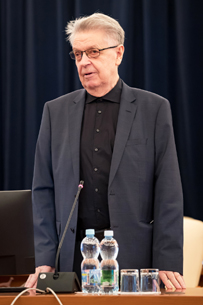 “I deeply respect M. G. Meshcheryakov not only as a prominent scientist but also as a person communication with whom enriches,” I. A. Golutvin (VBLHEP) started to awake his memories. “It was the summer of 1966, I was 32 and started my career in science. I was keen on what I was doing but Mikhail Grigorievich and Nikolay Nikolaevich wanted me to shift to LCTA for some reason. Meshcheryakov met me in an empty room of the administration building. I was not shy and spoke frankly. He truly understood me, I felt that he was from our environment, one of the scientific people. We agreed that I would work jointly with LCTA. I recall the years of close cooperation with Mikhail Grigorievich and his colleagues with pure nostalgia.”
“I deeply respect M. G. Meshcheryakov not only as a prominent scientist but also as a person communication with whom enriches,” I. A. Golutvin (VBLHEP) started to awake his memories. “It was the summer of 1966, I was 32 and started my career in science. I was keen on what I was doing but Mikhail Grigorievich and Nikolay Nikolaevich wanted me to shift to LCTA for some reason. Meshcheryakov met me in an empty room of the administration building. I was not shy and spoke frankly. He truly understood me, I felt that he was from our environment, one of the scientific people. We agreed that I would work jointly with LCTA. I recall the years of close cooperation with Mikhail Grigorievich and his colleagues with pure nostalgia.”
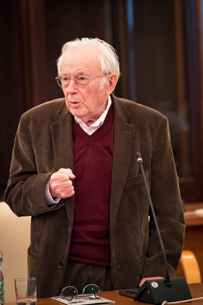 “I was happy to work with Mikhail Grigorievich for almost 30 years,” G. A. Ososkov (LIT) said. “But I had heard about him even earlier. In 1962, I started working at BLTP, in the computing department of E. P. Zhidkov. My friend S. N. Sokolov defended his degree and Meshcheryakov was his opponent. He performed brightly, with amazing artistry, he did not read out the text from the paper. He reviewed the dissertation very well and gave a deep assessment. I then asked who it was. And got the answer that it was a Dubna founder and he had been suspended from this activity. It should be noted that this suspension brought him back to science, he and his colleagues made a discovery. His appointment as the LCTA Director was a challenge for him, he did not know much about computer equipment but he insisted to organize the automation department in the Laboratory. The breadth of his approach, his ability to puzzle out everything, to mobilize people and give them the right vibes – this is what an organizer should be. He was democratic, he carefully listened to everyone at meetings. How could he be accused of authoritarianism? When he invited young specialists to his cottage, it was a great joy to listen to his stories.”
“I was happy to work with Mikhail Grigorievich for almost 30 years,” G. A. Ososkov (LIT) said. “But I had heard about him even earlier. In 1962, I started working at BLTP, in the computing department of E. P. Zhidkov. My friend S. N. Sokolov defended his degree and Meshcheryakov was his opponent. He performed brightly, with amazing artistry, he did not read out the text from the paper. He reviewed the dissertation very well and gave a deep assessment. I then asked who it was. And got the answer that it was a Dubna founder and he had been suspended from this activity. It should be noted that this suspension brought him back to science, he and his colleagues made a discovery. His appointment as the LCTA Director was a challenge for him, he did not know much about computer equipment but he insisted to organize the automation department in the Laboratory. The breadth of his approach, his ability to puzzle out everything, to mobilize people and give them the right vibes – this is what an organizer should be. He was democratic, he carefully listened to everyone at meetings. How could he be accused of authoritarianism? When he invited young specialists to his cottage, it was a great joy to listen to his stories.”
“I came here from Kazakhstan in 1959 to ask for some devices,” M. G. Itkis added. “I came to Mikhail Grigorievich. ‘Who are you?’ – ‘Ivan Yakovlevich Chastnikov sent me here.’ – ‘Vanka? I will call Administrative Director Karpovsky, we need to allocate two devices for temporary use. And remember: nothing is more permanent than the temporary…”
B. M. Starchenko presented a book-album “Mikhail Grigorievich Meshcheryakov. Portrait against the background of the epoch” issued with the support of JINR. Then, participants of the seminar watched the documentary “High energies of M. G.”
OlgaTarantina, JINR Weekly Newspaper
photos by Elena Puzynina
